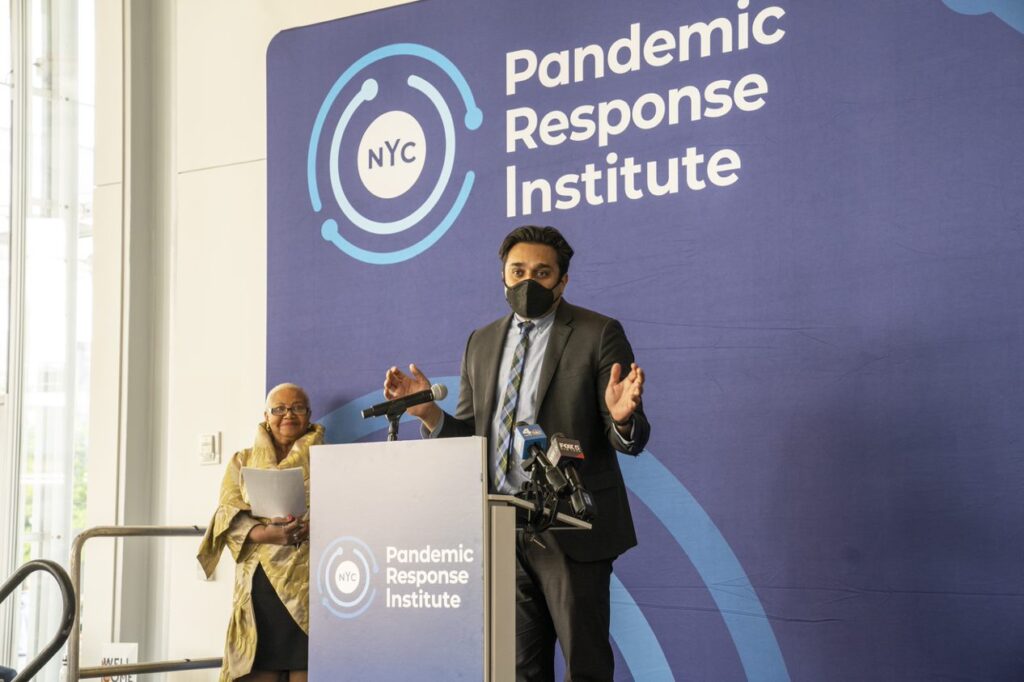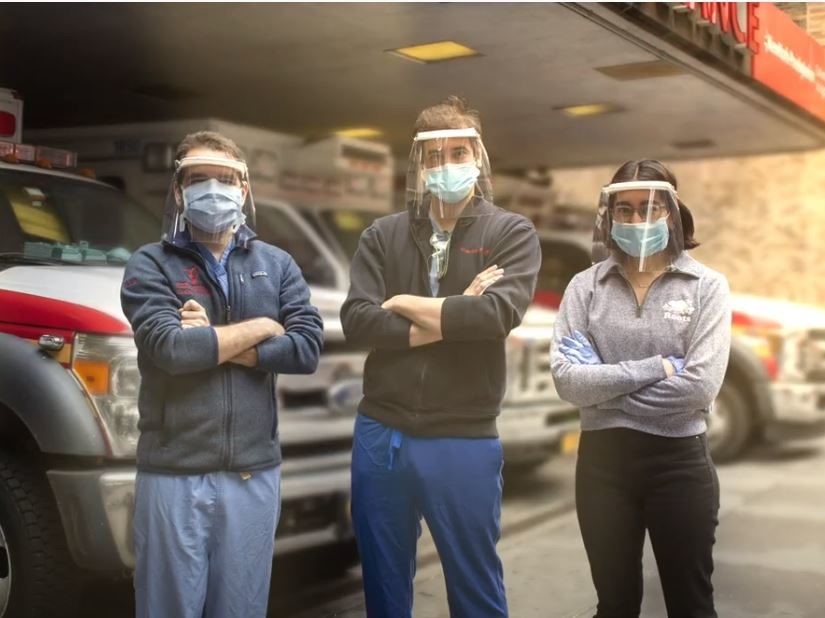As it has done across the globe, the COVID-19 pandemic has exacted a severe toll on New York City. Since March 2020, 40,000 New York City residents have died from COVID-19. But the damage extends well beyond the loss of loss of life to include ongoing illness, mental health impacts, social disruption, and economic harm.
Faced with this unprecedented health emergency, New York City stepped up. From the health department and hospital systems to community organizations, the business sector, and beyond, the city confronted this pandemic and regained its footing. But, still, COVID-19 exposed public health gaps that made New Yorkers vulnerable and shined a harsh spotlight on racial and economic disparities that left many of the city’s communities behind.
The unprecedented – and still ongoing – health challenge has generated a remarkable commitment to augment the city’s ability to confront future public health emergencies. That commitment has taken the form of the New York City Pandemic Response Institute (PRI), a landmark initiative to provide New York City communities with health solutions and information to prevent, prepare for, respond to, and recover from future health crises. Led by ICAP at Columbia University’s Mailman School of Public Health, along with key partner the City University of New York Graduate School of Public Health and Health Policy (CUNY-SPH), PRI is supported by New York City Economic Development Corporation (NYCEDC), along with a consortium of non-profit, community, and industry collaborators to help reinforce and diversify New York City’s public health infrastructure.
“The COVID-19 pandemic has opened our eyes to the critical need for strong and vibrant multisector partnerships to enable us to effectively protect New Yorkers from emergent health threats,” said Wafaa El-Sadr, MD, MPH, MPA, director of ICAP and Columbia World Projects, who is leading the PRI for Columbia. “The Pandemic Response Institute will create an unprecedented nexus for engagement, expertise, and resources from across our city that will enable us to help equip our city to equitably confront health emergencies.”
In coordination with the NYC Department of Health and Mental Hygiene (NYCDOHMH) and NYC Emergency Management (NYCEM), PRI will work hand-in-hand with New Yorkers in communities across the city’s five boroughs to enhance their capacity to develop locally tailored health solutions, information, and resources to prepare for, respond to, and recover from future health crises on every scale – from infectious diseases to weather-related emergencies, and everything in between.
Designed to support New York City across the entire lifecycle of emergency preparedness, response and recovery, PRI advances a dynamic set of activities that increase resilience to the adverse consequences of public health emergencies, maximizing engagement and impact, particularly in disenfranchised communities.
“New York City has a phenomenal number of resources to solve problems and it also has an incredible spirit as a city,” said Mitch Stripling, MPA, director of PRI. “No one else has the capacity that this city has, and we can use that to show how to solve problems in ways that lean on local solutions to help New Yorkers in every neighborhood.”
Stripling – who comes from a long history of leadership roles in emergency management and disaster response, most recently at the Planned Parenthood Federation of America (PPFA), and previously at the NYC Department of Health & Mental Hygiene (NYC DOHMH) – believes PRI is poised not only to protect New York and its residents, but to serve as a model for the entire nation and beyond. “A New York City neighborhood is sometimes as big as a small city. We can bring this incredible neighborhood-focus New York City has to figure out lessons that work for large and small cities alike around the world.”
The Institute is structured around seven key areas: innovation and scaling; data collection, sharing, and translation; workforce capacity and preparedness; epidemiology and modeling; community convening and learning; communications; and racial equity and social determinants of health. A dedicated and diverse team led by Columbia and CUNY faculty has been established for each of these areas. They will focus on advances such as technologies, tools, strategies, and models, connecting diverse city stakeholders to create a “whole-of-city” response, and facilitating the development of strategies that inform future preparedness, response, and recovery.
First announced in late 2021, PRI was officially launched on May 10, 2022 at an event held at The Forum at Columbia University. More than 400 people from the City’s administration, Columbia University, CUNY SPH, and a wide range of academic, community, government and business partners came together to mark the launch, which showcased research and innovations that faculty across Columbia and CUNY schools had undertaken in response to the pandemic.
On the occasion of the launch event, New York City Mayor Eric Adams stated: “The Pandemic Response Institute will bring together city agencies, experts across various fields, and nonprofit and for-profit partners to tackle some of the biggest, most intractable public health challenges for New Yorkers. I look forward to working with the PRI to help grow our public health toolbox with the strategic upstream solutions we need to tackle these crises.”
Among the speakers at the event were Columbia University President Lee C. Bollinger, CUNY Chancellor Félix V. Matos Rodríguez, Deputy Mayor for Economic and Workforce Development Maria Torres-Springer, Deputy Mayor for Health and Human Services Anne Williams-Isom, NYCDOHMH Commissioner Dr. Ashwin Vasan, NYCEDC President and CEO Andrew Kimball, NYCEM Commissioner Zach Iscol, CUNY-SPH Dean Dr. Ayman El-Mohandes, and Dr. El-Sadr.

NYC Department of Health and Mental Hygiene Commissioner Dr. Ashwin Vasan speaks at the official launch of the NYC Pandemic Response Institute
“The mission of the Pandemic Response Institute is to work with academic, community, government, and business partners across the five boroughs to make sure that the city is prepared for future public health emergencies” said Bollinger at the launch event. “Its goal is to do this in a way that addresses the structural inequities that make marginalized populations particularly vulnerable to the effects of these kinds of crises.”
PRI will be building from this event and will hold several future convenings to bring New Yorkers together to build on lessons learned and chart a way forward. Another key activity over the next year will be to begin to conduct a robust and rigorous review of New York City society’s pandemic response to provide concrete and actionable lessons and provide a new framework with which to review public health emergency responses.
The Pandemic Response Institute is supported with funding from the New York City Economic Development Corporation, Amazon, Cepheid, The Mailman School of Public Health, the Columbia University Fu Foundation School of Engineering and Applied Science, Columbia World Projects, and the CUNY Graduate School of Public Health and Health Policy.
To learn more about the New York City Pandemic Response Institute, visit pri.nyc.
About ICAP
A major global health organization that has been improving public health in countries around the world for nearly two decades, ICAP works to transform the health of populations through innovation, science, and global collaboration. Based at Columbia Mailman School of Public Health, ICAP has projects in more than 30 countries, working side-by-side with ministries of health and local governmental, non-governmental, academic, and community partners to confront some of the world’s greatest health challenges. Through evidence-informed programs, meaningful research, tailored technical assistance, effective training and education programs, and rigorous surveillance to measure and evaluate the impact of public health interventions, ICAP aims to realize a global vision of healthy people, empowered communities, and thriving societies. Online at www.icap.columbia.edu








